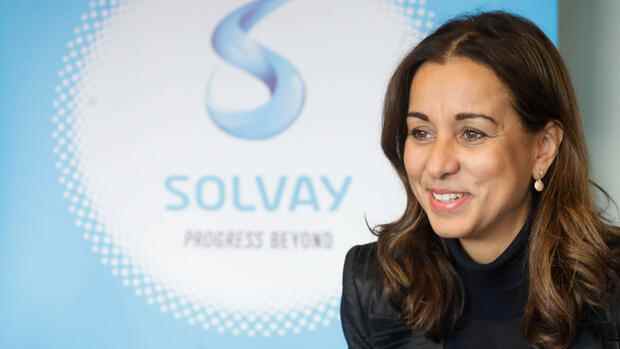The 53-year-old has been leading the Belgian chemical company since 2019.
(Photo: imago images/Belga)
Dusseldorf When the chemist Ilham Kadri took over the management of the Belgian chemical group Solvay in 2019, the brief was clear: after years of stagnation and a lack of vision, she should give the company, which was founded in 1863, future prospects. In the spring of 2022, this culminated in the previous highlight: Solvay will be split up and focused on businesses that contribute to sustainability and climate protection.
Not many mixed chemical companies have gone that far. But for Kadri, the split is just a logical step: Since taking office, the 53-year-old has been training Solvay at high speed for green transformation. She prescribed an “unstoppable ambition to achieve carbon neutrality and more sustainable business operations” for her teams, as she says.
Solvay was able to start the “One Planet” program designed by Kadri as early as 2020: In addition to more climate protection, it also aims for diversity. 36 projects to reduce emissions were started immediately. They aim to save 2.4 megatons of CO2 annually.
But that’s not all: a year after the start, Solvay continued to raise its goals. By 2030, CO2 emissions are to be reduced by 30 percent. Climate neutrality targeted for 2050.
Top jobs of the day
Find the best jobs now and
be notified by email.
Solvay intends to invest a good two billion euros to achieve this goal. That is a comparatively large sum for a company with an annual turnover of ten billion euros. What is decisive, however, is that Kadri saw the green conversion as an opportunity and a “business case” from the outset – i.e. as something with which you can earn good money.
New company for high-performance plastics
According to Kadri, the investments in the green conversion should even achieve returns that are far above the group’s capital costs. To ensure that the project expenditure goes in the desired direction, the CO2 costs are included in the return calculations and are regularly adjusted.
However, the strongest expression of the “business case” idea is the now planned split. High-performance plastics and other materials for the lightweight construction of e-cars, aircraft and medical technology are brought into a new company. The group wants to increasingly produce these materials from renewable raw materials and with chemical recycling.
But all this is not enough for the Solvay boss: Because the chemical group is also a leading manufacturer of products for lithium-ion batteries, the greatest possible recycling should be made possible. The partly bio-based ingredients for food and consumer goods will also move to the spun-off company. The energy-intensive bulk business with soda and other substances remains with the old group.
Among investors it is taken for granted that Kadri will concentrate on future business. For the time being, however, it makes the same demands on all business areas: climate protection, resource conservation and a better life are its goals. After that, she describes, every business area, every production facility is aligned – and it should go hand in hand with economic growth.
Soda works converted to biomass
That’s why the old shops are trimmed to lower CO2 emissions. The German site in Rheinberg, north of Duisburg, is set to be the world’s first soda plant to be operated with renewable energies by 2025. It will be converted to sustainable biomass.
From 2024, the huge soda plant in Dombasle near Nancy, France, is to be operated with fuels primarily obtained from waste. In the US, Solvay is one of the ten largest companies in terms of installed solar energy.
The course is well received by shareholders because it is associated with growing sales and profits. In 2021, the Belgian group increased comparable, adjusted profit by 27 percent and achieved a return of 20 percent.
For comparison: German chemical companies such as Lanxess and Evonik achieved margins of less than 16 percent in 2021.
“Kadri has done a lot to promote profitability and to give old Aunt Solvay a more agile touch,” says an analysis by Baader Bank. “The CEO saw value in the company where others didn’t.”
Born in Morocco, she is aware that when it comes to sustainability, she cannot just leave it at words. She recently witnessed a hedge fund’s attack on Solvay’s business practices in Italy. Activist fund Bluebell Capital has accused the company of dumping excessive amounts of waste from an Italian soda factory into the sea.
At first, Solvay accused Bluebell of ignorance because it was natural limestone and all legal regulations were complied with. But in early September, the group ended the dispute and pledged to reduce the discharge of waste into the sea off Italy. In addition, the production processes there are to be improved with an investment of 15 million euros.
More: What to look out for when investing sustainably

